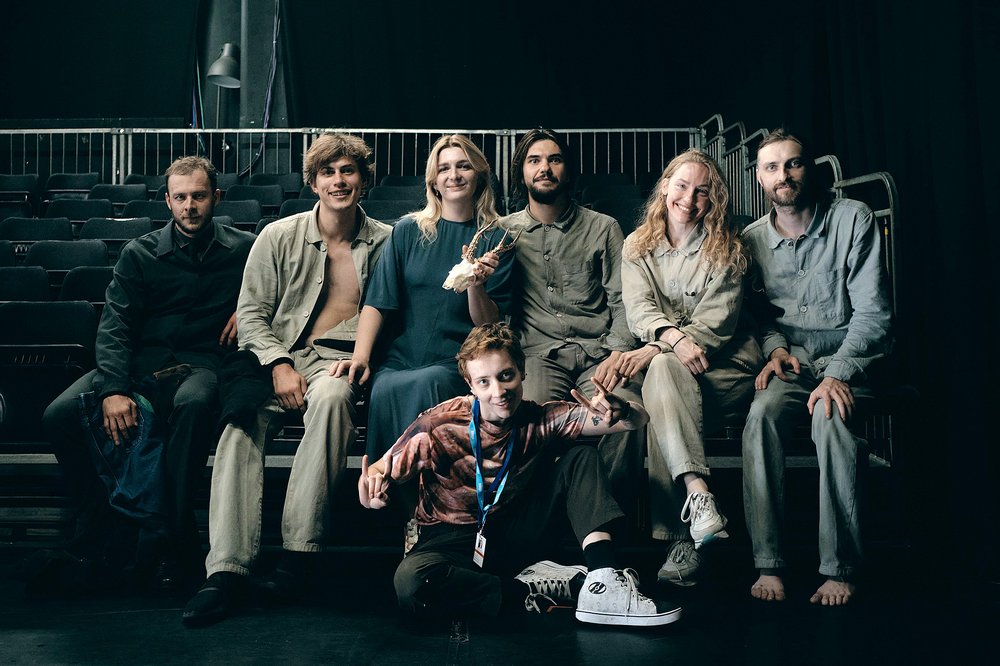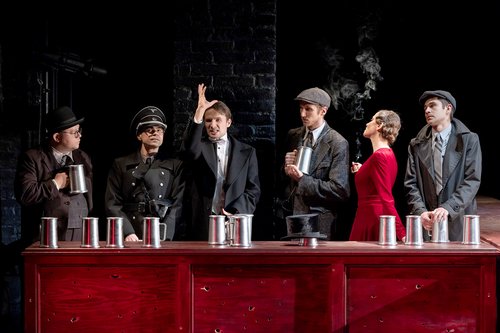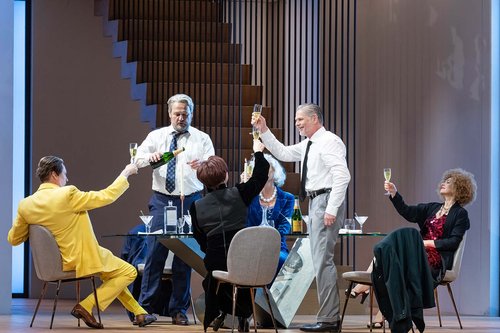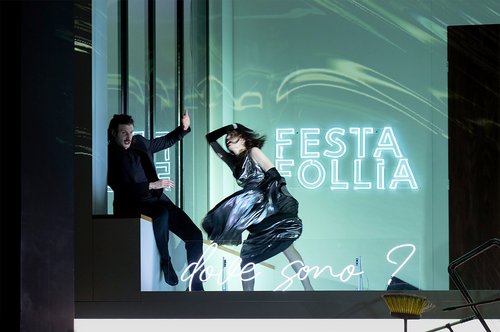New Slavic Theatre Company Sells Out at the Edinburgh Fringe Festival

1984. Play directed by Sofia Barysevich. The Edinburgh Festival Fringe. Photo courtesy: Lanta Sire
A new independent theatre company called Withintheatre has created a chilling production of George Orwell’s 1984. Directed by Belarusian born, London-based actor and director Sofia Barysevich, with actors from across Russia, Ukraine and Belarus, the premiere of the play quickly sold out at the Edinburgh Festival this Summer.
2024 is the fortieth anniversary of the fictional dystopian future that visionary British writer George Orwell saw back in the immediate post war years. Fascism may have been defeated but in its wake great swathes of the world came under a new yoke, that of stalinist style communism which took root in the Soviet Union.
‘Today there are fifty-three dictatorships around the world’ laments Anastasia Aush, (b.1999) one of the five actors in a new production for the stage based on Orwell’s original novel 1984. We are sipping green tea in a makeshift bar in Edinburgh’s contemporary arts centre Summerhall and I am here to interview Belarusian born, London based theatre director Sofia Barysevich (b.1998) whose company withintheatre is premiering the show in this year’s Edinburgh Fringe Festival. Two years ago, Orwell’s book 1984 was banned in Belarus. Barysevich discovered Nick Hern’s script based on the book, written during the pandemic, where he uses Orwell’s original text and condenses the novel into an intense drama centred around the doomed love story between Winston Smith and Julia. Although the relationship between Winston, played by Faiaz Valiullin (b.1996) and Julia lies at the heart of the play, it is never really about love. “It deals with love but make no mistake” says Barysevich, “this is not any reflection of true love, it is expressed through a visor of immersion, reflecting brain changes already factored in, the love is not real.”
Fifty-three dictatorships – however on or off the mark is a grim statistic I would rather not tally. Reflecting on the relevancy of the play, it happens that Scottish nonagenarian arts impresario Richard Demarco, who met the crew of 1984 the day before, came up with the figure and it resonated with their own understanding of the importance of the subject to people all around the world. Members of the audience came up after the show feeling a need to tell their own stories like one woman who expressed her frustration with Erdogan’s Turkey, and someone who talked about their own experiences with North Korea. The dystopian vision in 1984 may be exaggerated but elements of it feel very real and it acts as a warning about what can happen when dictatorships go too far. The venue at Summerhall is in many ways apt: it houses part of Demarco’s archive of the contemporary arts with its focus on Eastern Europe in the 1960s and 70s, when he was an early champion of artists from the other side of the iron curtain like Josef Beuys, Gerhard Richter and Tadeusz Kantor. From the beginning Demarco was actively involved in both the visual and performing arts, a founder member of the Edinburgh Fringe back in 1947 when he platformed a production of Maxim Gorky’s ‘The Lower Depths’ with actors from a working-class neighbourhood of Glasgow.
“We use theatre as a platform to speak up” says Sofia Barysevich who has a soft, friendly manner and speaks perfect home counties English, she has been living in England now since 2016. Barysevich initially trained to be an actress, both in Russia and the UK, first at the Cambridge School of Visual and Peforming Arts and then at the Royal Central School of Speech and Drama in London, and one day had her Eureka moment when a friend suggested she try directing instead and she has not looked back. Although she has found a natural synthesis in her experiences in the theatre both in Russia and the West, she talks about her own natural preferences especially of a Russian form of ‘stage movement’ (stsenicheskoe dvizheniye) which came to her via her own teacher a pupil of Mikhail Chekhov (1891-1955), a nephew of the great playwright, who was a student of Konstantin Stanislavsky (1863-1938). At times during the performance of 1984, which is set in a bare, dark stage set reminiscent of a prison or interrogation room the physical movements, gestures and interactions between the actors, feel like a choreographed dance, beautiful, controlled yet raw.
“Russian theatre is very dramatic” she reflects. “In Cambridge they would talk more about how to imitate states of being, you did not have to feel it, there was a focus on sensation and building on that. But I like digging deeper down into the raw feelings.” It is a bold approach, sometimes bordering on the extreme. Chekhov himself is said to have had a nervous breakdown, as he experimented with affective memory, a technique Stanislavsky promoted in which actors are encouraged to call on their memories of similar situations and bring those emotions into their characters in the play.
One of the keys to the success of withintheatre’s production of 1984 is that the actors all have close-to-hand, real experiences to draw from and the play touches a nerve at this specific moment in time. “We relate to the story so much we can use our own trauma and pain. It is so relatable that we barely need to act” says Barysevich. Ivan Ivashkin (b.1990) who delivers a faultless and chilling performance as Winston’s interrogator O’Brien is an experienced actor in both stage and film with an impressive curriculum vitae. He went on protest marches in Russia and knows what it is like to be the underdog forced into submission by the state; he left Russia when the military invasion of Ukraine started in 2022. Ukrainian-born Siberian actor Kolya Mulakov (b.1989) was at Teatr.doc for 10 years, a low budget opposition theatre group in Russia which dealt with social issues which in its prime existed on a knife edge. Like Barysevich he has a global talent visa which enables him to stay and work in the UK. Although the company consists of a melting pot of nationalities, Russian, Ukrainian, and Belarusian, they prefer to emphasise what they have in common, as ‘slav’ actors and hope that audiences do not just find a narrative about current politics in it but can find their own meaning.
They put the production together on a shoestring borrowing a vintage camera from parents and creating their own costumes by dyeing them. They have ambitions to grow, their sights set on London audiences, where they are currently all based and they want more, better technology. They would also like to expand the play, and dig deeper into the strong emotional states, rather than squeezing everything into the one hour that they have in Edinburgh. There is a real tension between the need to deliver Orwell’s original text, and the focus on physical movement and violent emotions which come out between the lines. Although Barysevich concedes: “In our production the text is more important than the movement which of course plays an important role.”
The name of the theatre company, ‘Withintheatre’ is a direct translation from the Russian ‘Izvnutri’ which is impossible to translate because in English it lacks the sense of something coming out of what is otherwise held inside. The actors hope that there is some place for Russian theatre traditions within contemporary theatre in the West, with its extreme physicality, and broad emotional range underpinned by strong traditions. Barysevich sees it as a positive force: “The beauty of Russian theatre is that everyone can relate to it, and it can help you to understand and heal, both as actors and the audience. It is about using theatre as a medium for us and the audience too.”

















